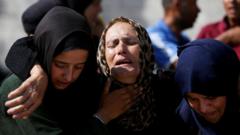As tensions continue between Russia and Ukraine, President Vladimir Putin has announced a three-day ceasefire from May 8 to 10, citing humanitarian reasons. However, skepticism surrounds the sincerity of this gesture, with critics urging for an immediate, longer-term ceasefire to truly address the ongoing conflict.
Understanding the Motives Behind Putin's Call for a Three-Day Ceasefire

Understanding the Motives Behind Putin's Call for a Three-Day Ceasefire
An analysis of the implications and authenticity of Russia's recent ceasefire offer amidst ongoing tensions in Ukraine.
Vladimir Putin has declared a three-day unilateral ceasefire in Ukraine, scheduled to take place from May 8 to May 10, coinciding with the 80th anniversary of the end of World War Two. This announcement follows a prior 30-hour truce during Easter, which both sides accused each other of violating. While the Kremlin labels this latest ceasefire as a "humanitarian" gesture, it raises the question of whether it is a genuine attempt to foster peace or merely a public relations strategy.
Ukraine has reacted with skepticism, questioning why Russia cannot initiate a ceasefire immediately. Ukrainian Foreign Minister Andrii Sybiha emphasized the need for an unconditional 30-day ceasefire, arguing that a true desire for peace would require immediate action rather than a delay until May.
The context of this ceasefire also intersects with the dynamics of international diplomacy. Critics suggest the Kremlin may be attempting to present itself as a peacemaker in the eyes of the United States, particularly President Donald Trump. Recent statements from Trump hint at a belief that Putin may not be fully committed to peace, observing that the ongoing missile strikes on civilian areas contradict any claims of goodwill.
On the U.S. side, Trump has made clear his frustration with the ongoing violence, expressing a desire for a permanent ceasefire to halt the bloodshed. The White House has acknowledged Putin’s ceasefire offer but insists that its efficacy hinges on a commitment to a more enduring resolution to the conflict.
Senior Russian officials have begun using the announcement of the ceasefire to cast doubt on Ukraine's willingness to engage in negotiations. Vyacheslav Volodin, speaker of the Russian parliament, suggested it is unlikely President Zelensky would support the ceasefire, framing Ukraine as the adversary even in the context of Putin's humanitarian claims.
As the situation develops, the scrutiny surrounding the motivations behind this ceasefire reflects the complex geopolitical landscape and the challenges of achieving lasting peace in the face of sustained conflict.






















